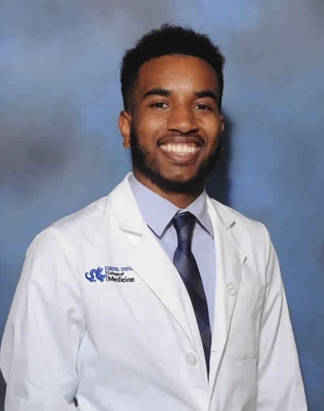
Hometown: Alpharetta, GA
Undergraduate: The Ohio State University, BS in Biology
Can you tell me a little bit about yourself before you came to Drexel?
Going far from home to Ohio State for college was definitely isolating at first. However, through that process, it really allowed me to find my passions and a strong identity as a Black male. Since then, I carry those on my sleeve wherever I go.
After graduating from Ohio State in December 2018, I did a 7-month AmeriCorps program with the Ohio Math Corps. I tutored math at an elementary school in Columbus, Ohio.
What drew you to medicine in general, and to the College of Medicine specifically?
While growing up Black in the suburbs, I had adopted this mindset of only seeing myself becoming a professional basketball player even though I didn’t really play much on my teams. That changed when I had to call the paramedics for one of my family members and felt so helpless in that situation. My interest in medicine sparked from there, and I began to notice the health disparities affecting Black people in America.
I was drawn to Drexel because of the community service initiatives and location in a diverse city because I really wanted a chance to serve minorities in medical school. The excellent public health program here led me to pursue the MD/MPH dual degree (learn more) to fulfill my desire to assess and treat underserved populations of people.
How did your undergraduate studies and volunteer experiences prepare you for medical school?
Physiology and organic chemistry were the undergraduate courses that really challenged me and impacted the way I studied. Those courses taught me how to truly learn the information instead of memorizing it, and I’m thankful I figured that out before medical school.
Serving with AmeriCorps at an inner-city elementary school in Columbus exposed me to a diverse population of students, some of whom presented with language and cultural barriers. Many of the kids I tutored also had challenges in their home lives that impacted their performance in school. I relate what I saw as a tutor to what I’m learning now about language and cultural barriers, and how every aspect of a patient's life can contribute to the presentation of their illness.
What organizations, extracurriculars, research or community service experiences have you been involved in at Drexel? How have they impacted your experience here?
I’ve been involved in the Drexel chapter of the Student National Medical Association (SNMA). Being part of that organization has provided me with a way to connect with a diverse group of classmates, and furthermore, be in touch with the Black medical community at Drexel and in Philly.
I have also volunteered with other College of Medicine students at the local Boys and Girls Club, which reassures my interest in working with kids. Plus, student interviewing for the Office of Admissions has been one of my favorite things to do during the school year, because I get to meet some interesting applicants. Lastly, I’d say playing for the flag football intramural team was the most fun I had when it came to weekend study breaks – it was a great way to spend time with classmates outside of school.
Please tell me what kind of work you do with SNMA. What are your goals in that work, and where does your passion for the work come from?
For SNMA, I am the corresponding secretary; I mainly handle the communication side of things, but this summer, all of us on the executive board had expanded roles. We felt a huge call to action because of the racial injustices happening in our country, and we made a list of demands and initiatives for which we would hold the College of Medicine accountable for in order to build a more inclusive, representative, and anti-racist medical school.
All of us on the executive board are Black, a population that has historically been underrepresented in medicine, and we all have this passion to change those low numbers and empower those of us already on this path. Many other SNMA chapters around the country have been concurrently doing similar things, which has been inspiring us. During the school year, SNMA and the Black Doctors Network will be resources for shadowing, networking, volunteering and more for our minority student population.
What advice would you give someone who is considering coming to Drexel?
There are a lot of cool activities and clubs to be involved in here, but don’t feel like you need to do everything. Drexel gives you the opportunity to customize your medical school experience to match your passions, interests and career goals – do that.
Although medical school takes up a lot of your time, students should also remember that Drexel is in such a great city and take advantage of fun opportunities in Philly. Don’t forget about your mental health.